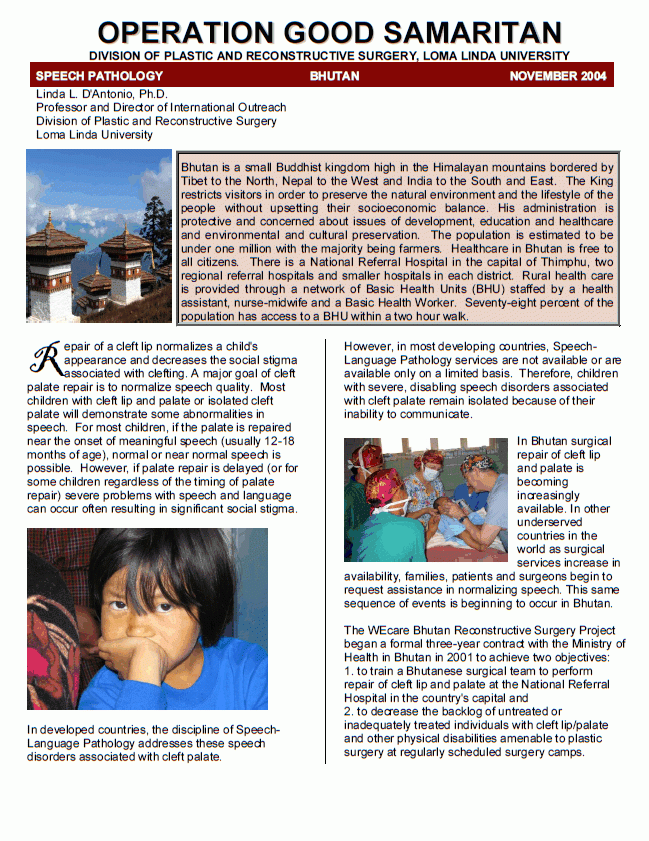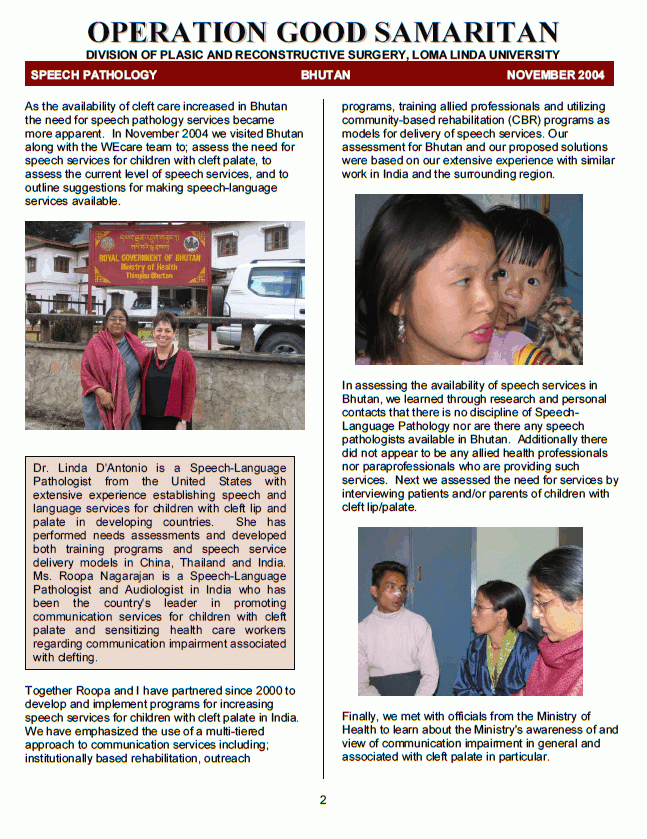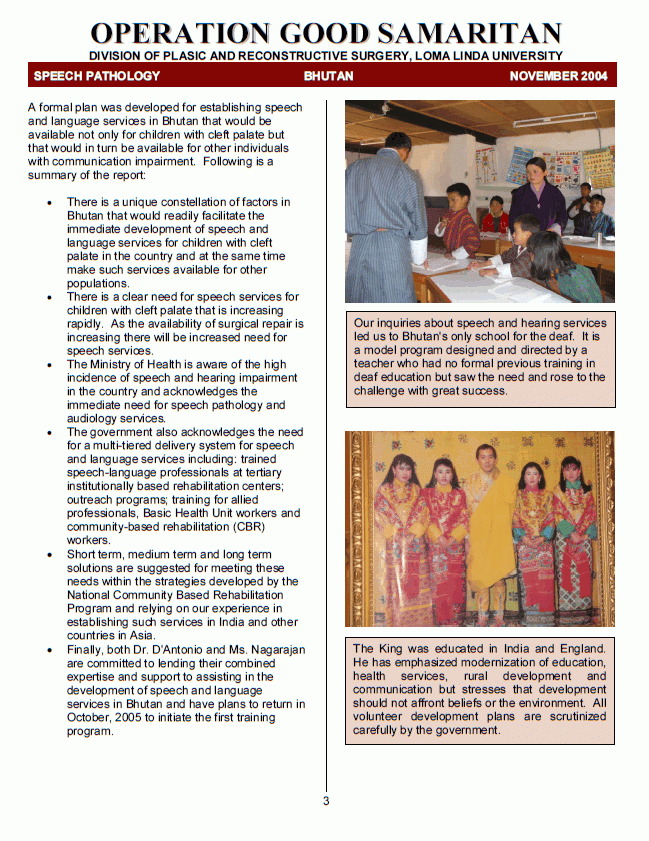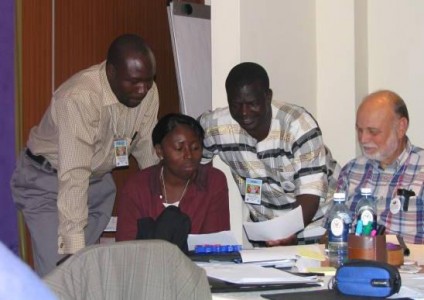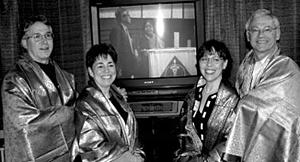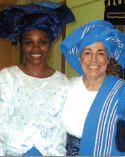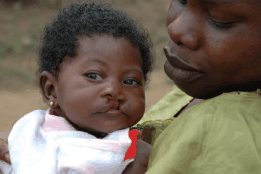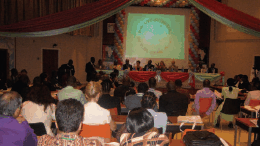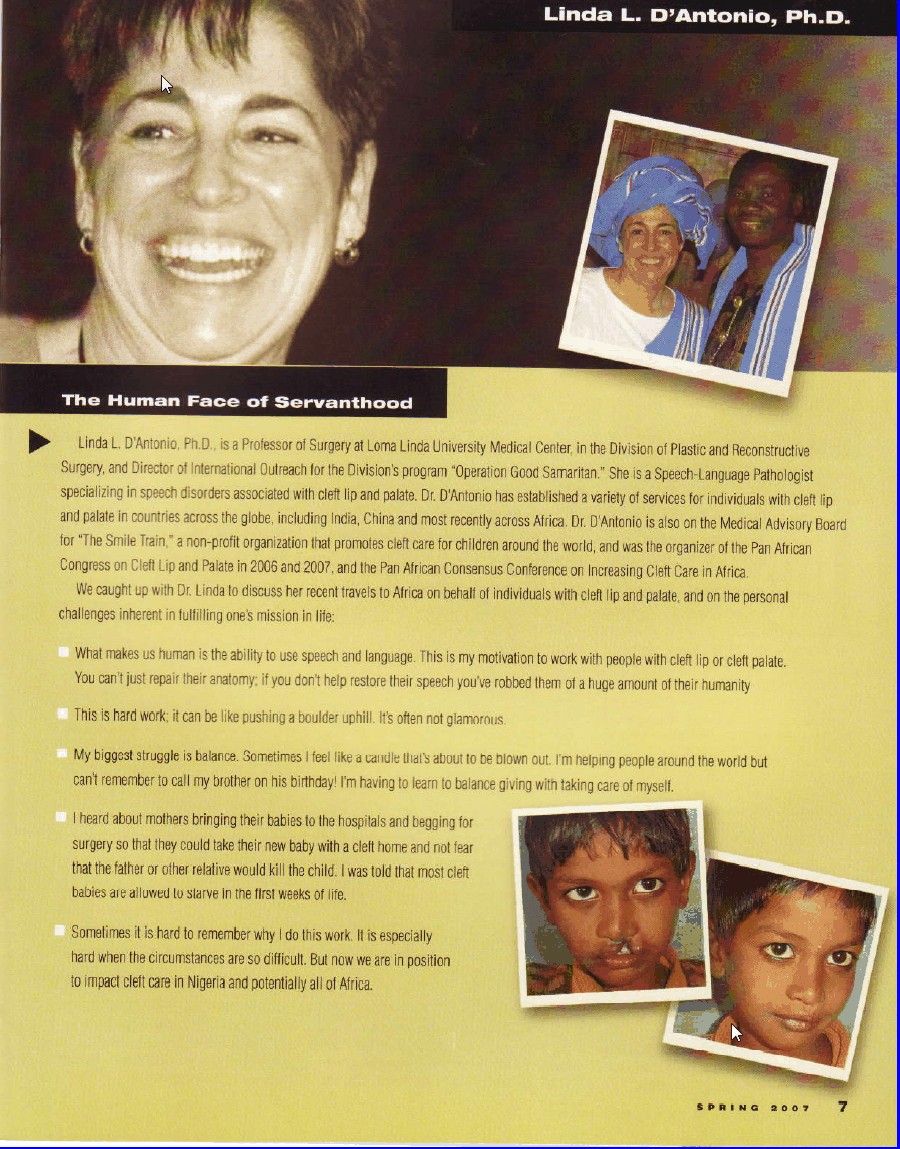
Archive for the ‘INTERNATIONAL WORK’ Category
By Patricia Thio
(This Article originally appeared in TODAY, the news magazine of Loma Linda University, on November 17, 2006)
The 2006 Pan African Congress on Cleft Lip and Palate (PACCLIP) that Adventist Health International (AHI), Loma Linda University, and the Smile Train sponsored last February brought 150 health professionals together from 10 African countries. The Smile Train—a nonprofit organization that is committed to eradicating the problem of cleft lips and palates—requested that AHI and LLU plan and organize two more meetings within Africa in 2006-2007. In return, Smile Train would sponsor the finances of the meeting.
“One of the outcomes of PACCLIP,” shares Linda D’Antonio, PhD, professor, School of Medicine, and main organizer of the event, “was the development of a small but extremely helpful network of surgeons who have continued over the year to provide valuable information regarding the challenges and solutions for increasing cleft care in Africa.” These surgeons have expressed repeatedly that the challenges for providing cleft care in Africa are unique and therefore require “African specific” solutions in order to build Smile Train partnerships. Because of that, Dr. D’Antonio planned the Smile Train Consensus Conference on Strategies for Increasing Cleft Care in Africa. Held in Nairobi, Kenya, from September 27 to 28, the purpose of the conference was to invite these surgeons and other key stakeholders “to tap into their wisdom about local problems and local solutions to increase cleft care,” explains Dr. D’Antonio.
Thirty-six participants from across sub-Saharan Africa attended the conference. The first day of the conference included an environment scan where participants discussed where cleft providers were, where they are, and where they are going. Then they talked about the trend analysis. For example, attendees concluded that they went from awareness of needs to capacity building, from solo care to team care, from neglect to awareness, etc.
Other discussions included strategies that are for African solutions to increase cleft care. Strategies included: 1) develop funding models that enhance capacity building, 2) capacity building for improved cleft care, 3) building a network and encouraging researchers in cleft lip and palate, 4) establishing standard treatment protocols as an aid to auditing, hence improved quality, and 5) improved level of awareness of cleft care.
Dr. D’Antonio noted that it would be easy to send one team to provide cleft care for a couple of weeks in Africa for the same amount of money that was used to empower the participants of this conference. “This time, however, we developed partners and solutions that will impact the whole entire continent,” she says. “Now participants will be the teachers and light the fires in the bellies of the next generation of cleft surgeons.”
Themba Nyirenda, DDS, an oral surgeon in Malawi, says, “It is pleasing to note that Africa has a wealth of talent, which once properly harnessed, will achieve lasting solutions to our cause. At this point and time, we cannot afford to be complacent. We need to build up, not down.”
The next step is PACCLIP 2007, to be held in February in Ibadan, Nigeria.
By Preston Clarke Smith
(This Article originally appeared in TODAY, the news magazine of Loma Linda University, on January 26, 2006)
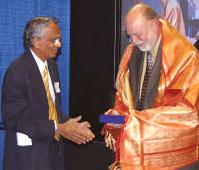
Loma Linda University offered a unique opportunity to speech and language pathologists on January 8 and 9. In collaboration with Sri Ramachandra Medical College & Research Institute (SRMC & RI) in Chennai, India, LLU put on a video conference on the specialty of cleft lip and palate (CLP) and the communication disorders caused by CLP. The conference marked the beginning of the sixth year of partnership between Loma Linda University and SRMC & RI in the area of communication disorders related to cleft lip and palate.
The conference came about as a result of numerous requests for advanced training in this specialty area within speech and language pathology, both in India and in the United States. Linda D’Antonio, PhD, professor at Loma Linda University, and Professor Roopa Nagarajan, MA, MSc, course chairperson for the department of speech, language, and hearing sciences at Sri Ramachandra Medical College & Research Institute Deemed University, co-chaired the conference as an extension of their five-year relationship started with one of the first Smile Train centers established in 2000.
“Our lives and our clinical experience have been enriched by our collaboration, and we hope that this meeting will foster many more collaborative efforts. We welcome you all and hope that this conference will serve to increase speech services for the children with cleft lip and palate to whom we are dedicated,” wrote Dr. D’Antonio and Professor Nagarajan in a welcome statement to the more than 200 attendees between the United States and India site.
The purpose of the training, held from 6:30 to 11:00 p.m. each day in Loma Linda, and from 8:30 a.m. to 1:00 p.m. in India, was to provide specific information regarding practical clinical skills for evaluation and treatment of communication disorders in children with cleft palate. The program was designed to provide access to internationally recognized faculty in the area of cleft palate who can then serve as resources for increasing the knowledge and skills of speech and language pathologists (SLPs) who are involved with this population of patients.
The conference featured seven experts presenting for the two half-days, including Loma Linda’s Dr. D’Antonio; SRMC & RI’s Professor Nagarajan; Robert Shprintzen, MD, director of several programs at Upstate Medical University in Syracuse, New York; Nancy Scherer, PhD, professor and chair of the communicative disorders department at East Tennessee State University; Karen Golding-Kushner, PhD, executive director of the Velo-cardio-facial Educational Foundation, Inc., an international organization dedicated to the dissemination of educational information about VCFS; John Riski, PhD, clinical director for the Center for Craniofacial Disorders at Children’s Healthcare of Atlanta; and David Kuehn, PhD, professor of speech and hearing science at the University of Illinois in Urbana-Champaign.
These seven prominent experts in CLP emphasized practical, relevant clinical skills for immediate use by both the Indian and American SLPs. A special emphasis was placed on early identification and intervention for p revention of the disabling speech patterns that are often associated with cleft palate.
The program began with a special inauguration ceremony presided over by Professor T.K. Partha Sarathy, MD, prochancellor of Sri Ramachandra Medical College & Research Institute Deemed University.
“It’s inspiring, this is my first time in Loma Linda,” said Dr. Sarathy to the attendees. “Today, looking at the other side of the world, is exciting!
“Ten years ago there were only four or five speech institutes in all of India. Now there are more than 15. Considering a population of one billion and hundreds of languages, we are just scratching the surface.
“Caring for the cleft may put a smile on the child, but it can’t help them speak,” continued Dr. Sarathy. “We need surgery and speech working together to sustain the program.”
Dr. Linda D’Antonio inaugurated the cleft center at Sri Ramachandra Medical College & Research Institute in 2000 with the help of Smile Train, one of the video conference’s main sponsors.
Smile Train is an international children’s charity dedicated to providing free cleft surgery and related treatment. The Smile Train is committed to fostering interdisciplinary care for children with cleft palate and has sponsored specialty training concerning speech disorders associated with cleft lip and palate throughout the world. The Smile Train empowers local surgeons and medical professionals in developing countries to perform the surgery themselves. These local medical teams can then leverage the modern training and support provided by the Smile Train to perform cleft surgery on their children.
Other conference sponsors were Transforming Faces Worldwide, SRMC & RI, Loma Linda University, Adventist Health International, Rehabilitation Council of India, and Super Duper Publications, Inc.
Transforming Faces Worldwide (TFW) is a nonprofit organization dedicated to improving the availability and quality of medical treatment and care of children and adults, with cleft lip and palate and related craniofacial disorders.
TFW provides funding, support, and encouragement to improve the quality of long-term cleft management in developing countries. TFW seeks to work alongside local organizations that are committed to the full development of the individual. TFW is supported by the generous financial support of charitable foundations and individuals. The SRMC / TFW project has received contributions from Omni Cell and Bridge Street United Church Foundation.
TFW also depends on volunteer support from medical professionals, international development experts, and individuals. In the United States there is little training or readily available continuing education for school-based speech pathologists who are on the frontlines of treating speech and language disorders for children with cleft lip and palate.
Loma Linda University serves San Bernardino County, which is the largest county in the United States and has a large population of children with cleft lip and palate. As in India, there have been numerous requests for training in therapy techniques for children with cleft palate. The video conference offered the opportunity for school-based SLPs in Southern California to learn alongside their counterparts in India.
The video conference was the first part of a five-day training session in India. The next two days (January 10 and 11) included a visit to the community-based rehabilitation site at Thiruvannamalai, India, where participants focused on hands-on training in assessment and rehabilitation planning for children with cleft lip and palate. The last day of the workshop (January 12) back at SRMC included group discussions, case presentations, and closing remarks.
Approximately 40 children received free speech evaluations and treatment plans as part of the extended program in India on the fourth day of the training.
(This Article originally appeared in Scope, the news magazine of Loma Linda University, Fall 2006 edition)
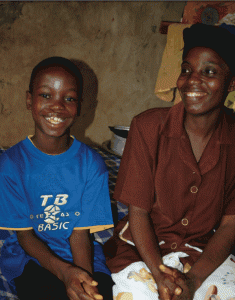
Harvest is an 11-year old boy in Nigeria. He’s teased at school and his father left him and his mother—all because of his cleft lip and palate. Harvest is just one of an estimated 360,000 people in Africa born with clefts. That’s why Loma Linda University, Adventist Health International (AHI), and the Smile Train—a nonprofit organization that is committed to eradicating the problem of cleft lips and palates went on board to help children who face this problem. From February 13 to 15, 2006, LLU, AHI, and the Smile Train sponsored the first ever Pan-African Congress on Cleft Lip and Palate. About 150 health professionals from 12 different countries in Africa participated in the conference held in Ibadan, Nigeria. “Loma Linda University and Adventist Health International were delighted to be partners in this worthy endeavor,” shares Richard Hart, MD, DrPH, chancellor of LLU and president of AHI.
“The Smile Train is working hard to expand our programs throughout Africa,” says president and co-founder Brian Mullaney. “Overall, we plan to train hundreds of surgeons and operate on thousands of children in the coming year.” According to Smile Train’s vice president, DeLois Greenwood, the Smile Train only helped 500 children in Africa out of the 35,000 they have helped worldwide last year. “When we wanted to expand our programs in Africa and met with Dr. Hart,” explains Ms. Greenwood, “we realized that LLU and AHI might be our spark that helps us reach the medical professionals because they have the network, resources, and reputation. And I dare say, had it just been the Smile Train, participants may not have come. But the fact there’s an affiliation with such a famous institution, the surgeons were quite interested.”
“To organize a conference in Africa is no small feat,” explains Dr. Hart. “We are particularly blessed with two people who helped put this together. Dr. Linda D’Antonio and Tomi Daniel were absolutely essential.” Linda D’Antonio, PhD, professor, School of Medicine, is a speech pathologist and a member of the medical advisory board of the Smile Train. Tomi Daniel, BL, a lawyer in Nigeria and wife of Danjuma Daniel, business manager of AHI–Nigeria, volunteered her time to help plan the event.
Last year, Dr. D’Antonio and Ms. Daniel met at an AHI meeting in Loma Linda. Dr. D’Antonio explained to Ms. Daniel how she was told clefts didn’t exist in Nigeria. So Ms. Daniel gladly accepted photos of children before and after they had their cleft repaired. She took them back to Nigeria and showed the photos around town, asking if they knew anyone with this problem. The result was overwhelming. Ms. Daniel found numerous people with clefts. During her search, Ms. Daniel learned that the word used for cleft in her region of Nigeria is chuandaji, meaning wild disease, something that cannot be cured.
“Taking the photos around restored hope,” shares Ms. Daniel. “It showed that clefts are not hopeless. It was a privilege to be a part of restoration for someone’s life.” After discovering the problem with clefts in Nigeria, the next step involved several months of intense planning for the first ever Pan African Congress on Cleft Lip and Palate (PACCLIP). PACCLIP was deemed a huge success and throughout the course of three days, about 150 health professionals participated in lectures, interactive seminars, and surgical videotaped demonstrations in order to establish a sustainable cleft care program in Africa.
“We were so excited and so surprised on the first day when they asked people to stay and form the Nigerian Cleft Lip and Palate Association,” says Dr. D’Antonio. “In my wildest dreams, I couldn’t imagine the excitement and joy of watching this unfold in front of me. “On the last day of the meeting, they didn’t want to leave. So they had an impromptu meeting and what was born was the Pan African Cleft Lip and Palate Association. That will be a high in my career that will be very hard to ever top. Smile Train, Loma Linda University, and Adventist Health International can be very proud of the stepping-stone that they provided that resulted in this association for the continent.
“I believe that the formation of that association is perhaps the greatest legacy of this meeting and the support from the three sponsoring organizations,” adds Dr. D’Antonio. The goals of the conference were to: identify existing cleft care providers and programs within Africa; make available a platform for those already providing cleft care in Africa to network and share their experience; raise public awareness about cleft lip and palate and to inform the public that cleft lip and palate can be surgically corrected; and to provide education and training for surgeons regarding the care of children with cleft lip and palate.
The 2006 Pan African Congress on Cleft Lip and Palate led to Smile Train’s request—that AHI and LLU plan and organize two more meetings within Africa in 2006-2007. In return, Smile Train would sponsor the finances of the meeting. “One of the outcomes of PACCLIP,” shares Dr. D’Antonio, main organizer of the event, “was the development of a small but extremely helpful network of surgeons who have continued over the year to provide valuable information regarding the challenges and solutions for increasing cleft care in Africa.”
These surgeons have expressed repeatedly that the challenges for providing cleft care in Africa are unique and therefore require “African specific” solutions in order to build Smile Train partnerships. Because of that, Dr. D’Antonio planned the Smile Train Consensus Conference on Strategies for Increasing Cleft Care in Africa. Held in Nairobi, Kenya, from September 27 to 28, the purpose of the conference was to invite these surgeons and other key stakeholders “to tap into their wisdom about local problems and local solutions to increase cleft care,” explains Dr. D’Antonio.
Thirty-six participants from across sub-Saharan Africa attended the conference. The first day of the conference included an environment scan where participants discussed where cleft providers previously were, where they currently are, and where they are going. Then they talked about the trend analysis. For example, attendees concluded that they went from awareness of needs to capacity building, from solo care to team care, from neglect to awareness, etc. Other discussions included strategies that are for African solutions to increase cleft care. Strategies included: 1) developing funding models that enhance capacity building, 2) capacity building for improved cleft care, 3) building a network and encouraging researchers in cleft lip and palate, 4) establishing standard treatment protocols as an aid to auditing, hence improved quality, and 5) improved level of awareness of cleft care.
Dr. D’Antonio noted that it would be easy to send one team to provide cleft care for a couple of weeks in Africa for the same amount of money that was used to empower the participants of this conference. “This time, however, we developed partners and solutions that will impact the whole entire continent,” she says. “Now participants will be the teachers and light the fires in the bellies of the next generation of cleft surgeons.”
Themba Nyirenda, DDS, an oral surgeon in Malawi, says, “It is pleasing to note that Africa has a wealth of talent, which once properly harnessed, will achieve lasting solutions to our cause. At this point and time, we cannot afford to be complacent. We need to build up, not down.”
The next step is PACCLIP 2007, to be held in February in Ibadan, Nigeria. Thanks to LLU, AHI, and the Smile Train, 11-year-old Harvest and many other children will get their clefts repaired—defeating chuandaji, the “wild disease.”
